|
|
|
Sort Order |
|
|
|
Items / Page
|
|
|
|
|
|
|
| Srl | Item |
| 1 |
ID:
099280
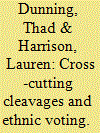

|
|
|
| 2 |
ID:
121089
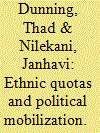

|
|
|
|
|
| Publication |
2013.
|
| Summary/Abstract |
Ethnic quotas are often expected to induce distribution of material benefits to members of disadvantaged groups. Yet, the presence of an ethnic quota does not imply that political mobilization takes place along ethnic lines: Cross-cutting affiliations within multi-ethnic party organizations may lessen the tendency of politicians to target benefits to particular ethnic groups. In this article, we evaluate the impact of quotas for the presidencies of village councils in India, a subject of considerable recent research. Drawing on fine-grained information from surveys of voters, council members, presidents, and bureaucrats and using a natural experiment to isolate the effects of quotas in the states of Karnataka, Rajasthan, and Bihar, we find weak distributive effects of quotas for marginalized castes and tribes, but suggestive evidence of the importance of partisanship. We then use survey experiments to compare the influence of party and caste on voting preferences and expectations of benefit receipt. Our results suggest that especially when politicians have dynamic political incentives to allocate benefits along party lines, cross-cutting partisan ties can blunt the distributive impact of ethnic quotas.
|
|
|
|
|
|
|
|
|
|
|
|
|
|
|
|
| 3 |
ID:
105909
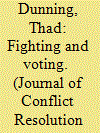

|
|
|
|
|
| Publication |
2011.
|
| Summary/Abstract |
Two recent research programs-one on the sources of democratic consolidation and another on the causes and consequences of violent conflict-have tended to evolve in relative isolation. The contributions to this special issue of Journal of Conflict Resolution help to bridge this gap, through explicit theoretical and empirical analysis of the relationship between fighting and voting. Armed conflict and electoral politics may be strategic substitutes, in that political actors may optimally choose to submit to the ballot box or instead attempt to impose their will by force; or they may be strategic complements, in that actors use violence to bolster their electoral aims, or use electoral returns as sources of information on underlying preferences that they exploit in armed campaigns. In either case, the distribution of popular support for contending parties can shape not only the incidence but also the type of armed conflict, and it can also influence the incentives of parties to invest in institutional mechanisms that mitigate commitment problems and help to bring violent conflicts to an end. The contributions to this issue illuminate these themes and demonstrate the value of bringing these separate research programs into closer dialogue.
|
|
|
|
|
|
|
|
|
|
|
|
|
|
|
|
| 4 |
ID:
061016
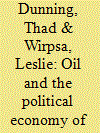

|
|
|
|
|
| Publication |
Spring 2004.
|
| Description |
p81-108
|
| Summary/Abstract |
Empirical studies have found a strong positive association between dependence on petroleum exports and the incidence and duration of civil war, yet these analyses remain largely bounded within a national level of analysis. Our case study of Colombia suggests that the international and transnational dimensions of oil, in particular the role of foreign direct investment and the centrality of global geopolitics, have an important influence on resource conflict. Processes of conflict generated by local productive activities pose perceived and real threats to supply, generating new security arrangements that reshape the material and discursive strategies of local and transnational actors. The linkages and interactions between local, national and transnational actors are therefore crucial to understanding the relationship between oil and conflict.
|
|
|
|
|
|
|
|
|
|
|
|
|
|
|
|
| 5 |
ID:
152235
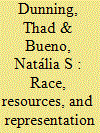

|
|
|
|
|
| Summary/Abstract |
What explains the persistence of racial or ethnic inequalities in descriptive representation in the absence of strongly politicized racial or ethnic cleavages? This article uses new data to demonstrate a substantial racial gap between voters and politicians in Brazil. The authors show that this disparity is not plausibly due to racial preferences in the electorate as a whole, for instance, deference toward white candidates or discrimination against nonwhites, and that barriers to candidate entry or discrimination by party leaders do not likely explain the gap. Instead, they document persistent resource disparities between white and nonwhite candidates, including large differences in personal assets and campaign contributions. The findings suggest that elite closure—investments by racial and economic elites on behalf of elite candidates—help perpetuate a white political class, even in the absence of racialized politics. By underscoring this avenue through which representational disparities persist, the article contributes to research on elite power in democratic settings.
|
|
|
|
|
|
|
|
|
|
|
|
|
|
|
|
| 6 |
ID:
064822
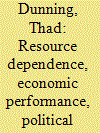

|
|
|
|
|
|
|
|